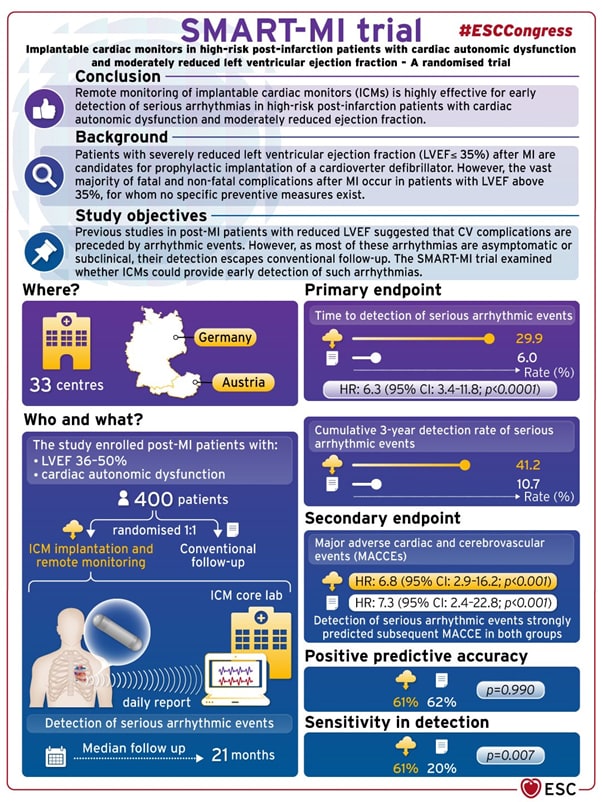By Ahmed El-Medany
As usual, there were a multitude of fascinating trials presented at the Hot Line session at the ESC Congress 2021.
Professor Axel Bauer, from Innsbruck Medical University in Austria, presented the SMART-MI trial, a prospective, randomised, open-label trial conducted between May 2016 and Feb 2021 at 33 centres in Austria and Germany. The trial examined whether implantable cardiac monitors (ICMs) were effective in early detection of arrhythmias in high-risk patients with autonomic dysfunction and reduced left ventricular function (LVEF 36-50%) following myocardial infarction (MI).
400 patients were randomly allocated in a 1:1 ratio to ICM implantation and remote monitoring, or conventional follow-up. ICMs were implanted subcutaneously and a telemonitoring system was used to submit daily reports to an ICM core lab. Local study centres were informed regarding detection of serious arrhythmic events by the ICM core lab.
The primary endpoint was time to detection of serious arrhythmic events, including atrial fibrillation lasting 6 minutes or longer, higher-degree atrioventricular block, fast non-sustained ventricular tachycardia (VT), and sustained VT/ventricular fibrillation.
During a median follow-up of 21 months, the primary endpoint occurred in 60 (29.9%) patients in the ICM group and 12 (6.0%) patients in the control group (hazard ratio [HR] 6.3; 95% confidence interval [CI] 3.4–11.8; p<0.0001). The cumulative 3-year detection rate of serious arrhythmic events was 41.2% in the ICM group compared to 10.7% in the control group.
Professor Bauer concluded:
‘Our study supports the use of ICMs in high-risk post-MI patients with moderately reduced LVEF and cardiac autonomic dysfunction as a sensitive tool for continuous risk assessment.’
Source: Bauer A, et al. Hot Line: SMART-MI. Presented at: European Society of Cardiology Congress; Aug. 27-30, 2021 (virtual meeting).
Figure 1 (Top): Taken from the ESC Congress 2021. Visual abstract of the SMART-MI trial.

